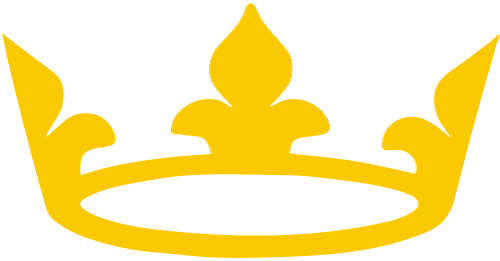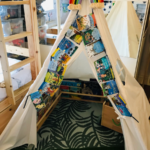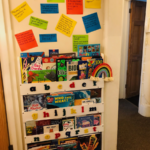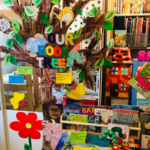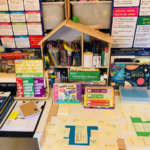- CURRICULUM OVERVIEW Reception to Year 6 2023 2024
- Reception Autumn Term Topic Overview
- Reception – Autumn 2 Term Topic Overview
- Reception – Spring Term Overview
- Reception – Spring Term 2 Overveiw
- Reception Summer 1 Topic Overview
- Year 1 Autumn Term Topic Overview
- Year 1 – Spring Term Topic Overview
- Year 2 Autumn Term Topic Overview
- Year 2 – Spring Term 1 Overview
- Year 2 – Spring Term 2 Overview
- Year 2 – Summer Term Topic Overview
- Year 3 Autumn Term Topic Overview
- Year 3 – Spring Term Overview
- Year 3 – Summer Term Topic Overview
- Year 4 Autumn Term Topic Overview
- Year 4 -Spring- Term Overview
- Year 4 – Summer Term Topic Overview
- Year 5 Autumn Term Topic Overview
- Year 5 – Spring Term Overview
- Year 5 – Summer Term Topic Overview
- Year 6 Autumn Term Topic Overview
- Year 6 – Spring Term Overview
- Year 6 – Summer Term Topic Overview
- Science Overview Knowledge and Skills
English is at the heart of the curriculum. We are ambitious for all learners and strive for them all to achieve excellence. We provide a learning environment where children are nurtured to articulate their thoughts, opinions, feelings and wishes through spoken language. They will view spoken language as a powerful tool to enable their voice to be heard whilst having the empathy to listen to other’s views respectfully. Reading is the skill which will unlock a lifetime of opportunities for our pupils. We aim to foster a life-long love of reading by building rich reading communities where reading is at the heart of children’s lives. Pupils are taught to read for pleasure, meaning, understanding, purpose and learning. Through the provision of quality, language-rich texts, we will inspire our pupils to be curious and playful with language so that they are willing to take risks and develop unique, personal writing styles. Pupils will understand the different purpose and forms of writing and become excellent at written communication, understanding the impact and influence that this can have on the reader. Pupils will see their own lives and the lives of others through the range of literature that they are exposed to and this will enable them to gain the knowledge, imagination, empathy and, ultimately, have ambitious goals for themselves to become global citizens of the future.
Reading is an important skill for our children to acquire. It opens doors and opportunities in their lives and allows them to become independent, life-long learners. Phonics is a crucial part of this as it is one of the early steps on this road. At Seven Kings we follow the Little Wandle Phonics Programme which gives children the consistency and structure that is needed to make great progress in phonics and early reading.
What is phonics?
Phonics is a way of teaching children to read quickly and skilfully. They are taught how to:
- recognise the sounds that each individual letter makes,
- identify the sounds that different combinations of letters make – such as ‘sh’ or ‘igh’,
- Segment the sounds in words,
- blend these sounds together from left to right to make a word,
- Use these skills to both read and spell.
What Programme do we follow?
At Seven Kings, we follow the Little Wandle Phonics Programme. Phonics is taught through daily lessons in Reception and Year 1 and followed up through regular small group reading sessions where children can apply the skills that they are learning.
The books that we read with children in school are perfectly matched with their level of phonemic awareness within the Little Wandle Programme and this helps keep reading an enjoyable activity where children can make great progress.
Each child also receives a reading book to take home each week that is closely matched to their phonemic awareness. It is important that you listen to your child reading this book regularly at home.
The Little Wandle Phonics programme offers a wealth of resources for parents and carers to support at home and we encourage you to look through the resources in the link below. There are printable resources and also guidance videos so that you can become an expert in supporting your child to develop into a confident reader with a love of books.
https://www.littlewandlelettersandsounds.org.uk/resources/for-parents/
Phonics Assessment
Children’s phonic knowledge is assessed and reviewed at strategic points during the year so that teachers can identify any gaps or areas for development. We are then able to adapt teaching and provide small group support so that children make good progress.
The National Phonics Screening Check is performed in June in Year 1. The purpose of the screening check is to confirm that children have reached an age-appropriate standard in phonics. At the end of Year 1, any children who have not met the standard are identified and supported.
- https://www.youtube.com/watch?v=-ZtjFIvA_fs&t=1s
- https://www.youtube.com/watch?v=qDu3JAjf-U0
- https://www.youtube.com/watch?v=DvOuc7cWXxc&t=1s
- https://www.youtube.com/watch?time_continue=1&v=VtoJZMVgy1I&feature=emb_logo
- https://www.youtube.com/watch?v=NTC0PbtmeUA&t=1s
- https://youtu.be/IL5YUCPyC5I
Powerpoint for parents
Home Reading
Daily reading together at home is an important way in which you can help your child. As you share books, you are helping improve your child’s reading skills and also showing them how important and enjoyable reading is. Our reading books are organised into coloured Book Bands using Bug Club Phonics, Oxford Reading Tree and Project X. Children are assessed regularly and move onto the next Book Band when their fluency and understanding show that they are ready. Children move through the Book Bands until they reach the required standard to become a ‘Free-Reader’, where they are able to choose their own book to read from our school or class libraries. In addition to a personalised reading book, children are able to take a book home from the school library or access e-books through our online library platform.
Ideas for an inspirational book corner at home courtesy of Year 2
- Parents Reading with Children
- 7 Top Tips to Support Reading at Home
- 7 Top Tips to Support Reading at Home – Bengali
- 7 Top Tips to Support Reading at Home – Lithuanian
- 7 Top Tips to Support Reading at Home – Polish
- 7 Top Tips to Support Reading at Home – Punjabi
- 7 Top Tips to Support Reading at Home – Urdu
Education Endowment Foundation Helping Home Learning: Reading with Trust
Reception and Key Stage 1 Reading
Every child in Reception and Year 1 is heard read by a teacher at least once a week to support their fluent decoding, comprehension and extend them individually. In the Summer Term of Year 1, children also begin to take part in guided reading sessions with their teacher. In these sessions, children will read and discuss a text in a group. Supported by their teacher, they will focus on decoding, reading fluency and comprehension skills.
Key Stage 2 Reading
In Key Stage 2, children progress from guided reading in small groups to whole class guided reading. They will continue to read a variety of age-appropriate texts and with the support of their teacher, take part in discussions and activities which will increasingly develop their vocabulary and understanding of what they have read.
Reading for Pleasure
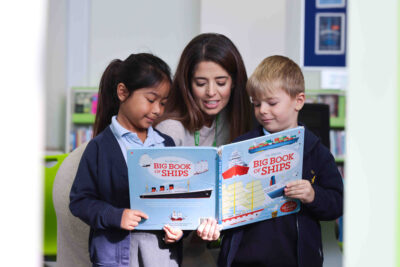 At Seven Kings School, we feel passionately about the importance of reading for pleasure for both children and adults. Reading independently, as well as hearing texts read aloud, is a magical experience and opens up a whole new world to your child. Not only does reading for pleasure have a positive impact on parts of our lives such as well-being, aspirations and empathy towards others, there is also strong evidence that children who read for pleasure are more likely to achieve high academic success across all subjects when they leave school.
At Seven Kings School, we feel passionately about the importance of reading for pleasure for both children and adults. Reading independently, as well as hearing texts read aloud, is a magical experience and opens up a whole new world to your child. Not only does reading for pleasure have a positive impact on parts of our lives such as well-being, aspirations and empathy towards others, there is also strong evidence that children who read for pleasure are more likely to achieve high academic success across all subjects when they leave school.
During the school day, each class will take time to sit down together and listen to a text read by their teacher. This might be a picture book, novel, poem or information text. This is an important part of the day, where the children can relax, enjoy a text together as a class and engage in conversations about what they have listened to. These sessions help to nurture our pupils as readers, allowing them to explore their likes and dislikes, make connections, broaden their vocabulary and excite them about author and genre choices for future reads.
Big Reading Push
In the summer of 2020, we launched our Big Reading Push by hand-delivering a book to each of our students from Reception to Year 11. In the Primary School, weekly reading challenges were set for Home Learning.
Inspired by some of our favourite authors and the British Library’s Miniature Book Project, we created our own wonderful range of mini books. From recipe books to stories and information books the children’s creativity was endless. Take a look at some of our aspiring authors and illustrators miniature books here:
What Seven Kings School children say about being read to in class:
I love my teacher reading aloud to us because I can imagine it better without worrying about reading the words and their expressions help me to understand the character’s feelings and reactions.
I like it when the whole class gets together and listens to Miss read.
I think it’s a great way to read a book. I am able to become the character in the book.
Well, she lets us into another world and reads gracefully and lets everyone get involved.
He uses lots of different voices for the characters. It’s so funny!
50 Recommended Reads:
As well as classroom libraries, all children have the opportunity to regularly visit our school library where they can take time to read quietly, learn how to browse the books and select a text which interests them. They are able to take these books home, where we encourage parents to take the opportunity to share and discuss the book with their child. As well as our school library, we also provide an online library with a substantial selection of e-books that the children can select and read.
English Lessons
The teaching of reading is also embedded in our daily English lessons where learning focuses on both reading and writing outcomes across a unit of work. Lessons are taught using a high-quality children’s text which links to our connected curriculum theme, where possible.
All elements of the National Curriculum For English: grammar, punctuation and spelling, composition and reading and speaking & listening skills are included in these lessons.
Education is not the learning of facts but training the mind to think! – Albert Einstein
We want to inspire our learners to become independent, creative and critical thinkers; to equip them with the knowledge and skills to flourish in whatever they do and to love mathematics. We provide a learning environment where learners are engaged and challenged in their way of thinking; they have opportunities to work both independently showing resilience and to work collaboratively with their peers, striving to achieve their potential. By developing children’s reasoning skills and their ability to communicate these across the curriculum, they will become successful problem solvers so that they have the ability to apply these skills to real life situations.
Mathematics National Curriculum
Purpose of Study
Mathematics is a creative and highly inter-connected discipline that has been developed over centuries, providing the solution to some of history’s most intriguing problems. It is essential to everyday life, critical to science, technology and engineering, and necessary for financial literacy and most forms of employment. A high-quality mathematics education therefore provides a foundation for understanding the world, the ability to reason mathematically, an appreciation of the beauty and power of mathematics, and a sense of enjoyment and curiosity about the subject.
Aims
The national curriculum for mathematics aims to ensure that all pupils:
- become fluent in the fundamentals of mathematics, including through varied and frequent practice with increasingly complex problems over time, so that pupils develop conceptual understanding and the ability to recall and apply knowledge rapidly and accurately
- reason mathematically by following a line of enquiry, conjecturing relationships and generalisations, and developing an argument, justification or proof using mathematical language
- can solve problems by applying their mathematics to a variety of routine and nonroutine problems with increasing sophistication, including breaking down problems into a series of simpler steps and persevering in seeking solutions.
Mathematics is an interconnected subject in which pupils need to be able to move fluently between representations of mathematical ideas. The programmes of study are, by necessity, organised into apparently distinct domains but pupils should make rich connections across mathematical ideas to develop fluency, mathematical reasoning and competence in solving increasingly sophisticated problems. They should also apply their mathematical knowledge to science and other subjects.
Daily Arithmetic Practice – Fluency
Fluency in the recall of key number facts is a crucial aspect of the expected standard for each year group, as well as being a vital skill when we use mathematics in our daily lives. Fluency in number facts underpins much of the mathematics curriculum. Without this fluency, children are hindered in moving on in many areas of the curriculum, which rely on a good grasp of number. They will not meet expected standard and will struggle to cope with basic assessments.
To ensure our children learnt these number facts and can cope with the arithmetic demands of their year group, class timetables include:
- 15 minutes daily for arithmetic practice, including weekly number facts tests
- Three Oral & Mental Starters per week dedicated to learning and practising number facts (all four operations)
- Daily counting/chanting/reciting key facts (2 or 3 minutes at a time). This may be in the maths lesson but may also be incorporated in the day, e.g. lining up, going to the playground, coming indoors etc.
Every child from Year 1 to Year 5 has their own Seven Kings School Times Tables Passport, which they need to keep with them from year to year. Achievement is: bronze – counting in sequence; silver – multiplication facts; gold – division facts. When all of the times tables or number facts expected for their year group have been learnt, they are issued with a certificate in assembly. Children may then go on to learn the next year’s facts. Please do not do this at the expense of the addition and subtraction facts though as these are crucial too.
At Seven Kings School primary campus, all children have a login for Times Tables Rockstars to help them practise their math skills and apply their known facts in a fun, safe way online.
Bronze, Silver, Gold Approach to Learning Addition and Subtraction Facts.
Expectations of Multiplication and Division for Each Year Group
Progression in Calculations
We have a clear policy for progression through mental and written calculations with a strong focus on learning number facts to aid mental calculation strategies. We want children to be able to choose when to do a calculation in their heads, with a brief jotting or when to use a written method. We teach them to choose a method that is appropriate, efficient and reliable so that written methods do not over-ride their ability to work out a calculation in their head, which is often much more efficient and reliable.
By using our ‘Best Friend in Maths’ and our ‘Second Best Friend in Maths’, children are enabled to make links between mathematical areas of learning rather than in isolation.
Best Friend and Second-Best Friend in Maths
Reasoning and Problem-Solving
Mathematical reasoning means thinking through maths problems logically in order to arrive at solutions. It involves being able to identify what is important and unimportant in solving a problem and to explain or justify a solution; being curious, wondering why things are the way they are and attempting to explain them:
- Choosing what to do and how to do it in a wide range of contexts;
- Making a ‘reasoned guess’ about what they think might happen;
- Using particular examples to test general statements that either they or someone else has come up with;
- Giving reasons for why things are true or not;
- Looking for patterns, structure and meaning in the mathematics that they do.
Reasoning is important because it is the means by which pupils deepen their mathematical understanding. It enables pupils to explore and discover the underpinning concepts and to make connections with earlier learning so that they can use it independently.
There is an infinite amount of possible calculations in mathematics. It is not possible to teach children how to solve every possible calculation. Instead what we aim to do is equip them with an awareness of the pattern in number and a range of efficient strategies to draw from.
In the same respect, talk is vital too. Mathematics has a rich vocabulary. When pupils begin to use the correct vocabulary it is empowering. Children who can predict, speculate and test are thinking more like mathematicians. We want to hear, “I think it could be because…”
Mathematical Vocabulary and Phrases
National Curriculum Mathematics Glossary
We use mistakes as learning opportunities to address misconceptions and to encourage deeper thinking and reasoning when solving problems, we ask questions such as
- Is it always, sometimes or never true that …?
- What’s my rule?
- What can’t it be?
Through the use of challenging problems in real contexts, we set high expectations of response from children – orally, in pictures, using numbers and by using the written word.
Try out some tasks at home: NRich Maths At Home – home learning tasks to support problem-solving and reasoning without a teacher.
Maths Lessons
The daily maths lesson teaches a sequence of work over time, focussing on the basic principles of a concept first and learning this through a concrete approach to ensure understanding of the concept. By having a deep understanding, using a variety of resources and applications, children can apply this in other contexts and make connections in their learning.
Each group of children have their own set of number resources, such as number fans, number lines or tracks, bead strings and place value counters to enable to them to choose and use the appropriate equipment to support their learning in a concrete or pictorial way.
We teach procedural fluency and practise this in different ways before moving onto more abstract representations. Throughout the teaching sequence, we provide opportunities to problem solve and reason – whether through oral questioning or through given tasks.

Assessment
At the beginning of every new unit of learning, children are given key questions to elicit their understanding and to highlight any misconceptions from their prior learning.
Children are assessed on a daily basis based on their class work and oral responses in lessons. This feeds into the planning and adaptation of future lessons, the next day and onwards.
At the end of every unit, children are given an assessment task and this, combined with class outcomes, informs the teachers judgement on what they need to teach next to move each child on.
Termly assessments take place, focussing on the learning from that term and summative assessments take place at the end of the academic year to support decision making for the final teacher judgement in relation to the expected standard for the year group. Reports to parents will provide one of the following judgements:
- Below – working on objectives/content from a given year below their current age
- Working Towards Expected Standard – a child who has met the previous year’s expected standard but has not yet grasped all concepts from the current year
- Working at the Expected Standard – a child who has achieved the National Curriculum objectives for their year group; which includes fluency in recalling number facts and carrying out appropriate mental and written calculations.
- Working at Greater Depth Within the Expected Standard – working on current content (Expected Standard) but at a deeper level. A key indicator of whether or not children are working at greater depth will be their levels of confidence and independence when solving problems and tackling more challenging tasks involving the need to reason.
At Seven Kings we aim to inspire the students so that they continue to question and learn even after they leave us. Our intention is to leave a lasting impact on the students so that they develop an inherent need to continue their understanding of the world around them.
| I | Ignite the curiosity and wonder of the world around us and to provide them with the necessary skills to allow their minds to soar and find new possibilities for enhancing life for all: We do this through high quality teaching. The students will be exposed to a range of learning opportunities to enrich, enhance and further support their understanding. Through science the students will be able to predict, understand and analyse what they have found. |
| N | Never give up! Developing resilience: We want the students to acquire the necessary skills to not only understand the science that we know today but also want to discover. We encourage them to: answer questions we don’t have the answers to yet; to know the past, the present and to imagine the future implications and uses of science innovations, discoveries and inventions. |
| S | Supporting the students in an ethical quest for understanding science and the moral concerns new scientific innovations can have for not only humanity but for all life on this planet: It is our intention to teach the students to develop a truer understanding that just because we can, doesn’t always mean that we should. |
| P | Preparing the students for the wider world: It is the intention of science at Seven Kings Primary to provide students with a solid understanding of the world around them. Developing their natural curiosity and engaging them through investigation to innovate and develop their understanding of scientific phenomena. |
| I | Inclusion – No child left behind: At Seven Kings Primary we deliver a science curriculum that is fully accessible to all students, regardless of ethnicity, ability or gender by providing a broad and balanced curriculum. |
| R | Range of transferable skills: All students are encouraged to develop and use a range of skills, including observations, planning and investigations. They are also encouraged to question the world around them and become independent learners in exploring possible answers for their scientific based questions. The student will be taught subject specific language that will enrich their vocabulary and further enable them to develop stronger explanation skills which will support their reasoning and problem-solving capabilities. |
| E | Encouraged to develop their critical thinking skills: We equip the students with the scientific knowledge to enable them to develop their critical thinking skills which helps them to understand the world around them. |
Science Websites to explore:
- https://www.bbc.co.uk/bitesize/subjects/z2pfb9q
- https://www.sciencekids.co.nz/space.html
- https://www.stem.org.uk/
- https://www.brainpop.com/science/energy/alberteinstein/
- https://www.nasa.gov/kidsclub/index.html
- https://kids.nationalgeographic.com/
- https://www.bbc.co.uk/teach/terrific-scientific
- https://sciencebob.com/
- https://explorify.uk/en/activities
- https://wowscience.co.uk/
